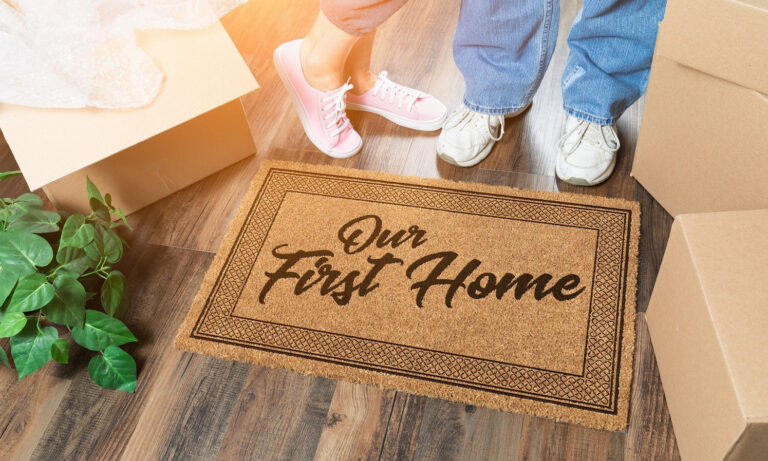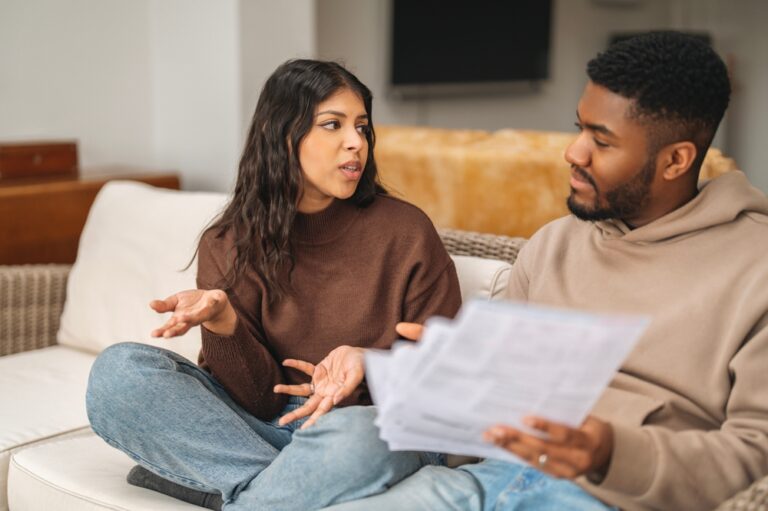Buying property with friends has become more and more popular as UK house prices have increased.
But there’s a lot to consider and buying with friends may not be for everyone as it comes with high degree of risk.
In this guide, we’ll explain everything you’ll need to think about before you take the plunge and club together to get that crucial first foot on the property ladder.
How to buy a house with friends
Before you decide to buy a property with a friend, or friends, here’s how you should go about it and what you’ll need to think about along the way:
1. Be honest about finances
When buying with friends, you should always be honest with each other about your financial situations.
Whether you’re thinking of buying with one friend, or there are a group of you pooling your resources to get on the property ladder, be up front about:
- Your individual level of debt
- Your credit history
- Whether your earnings are likely to change in the near future
Your individual financial situations could affect your mortgage
borrowing ability, while once you own a property together, you’ll be financially ‘linked’ to your co-owners.
2. Establish your budget and what you can afford
It’s always important to budget for a property purchase – regardless of whether you are a first-time buyer, experienced homeowner, couple or friends buying for the first time.
Be clear on how much deposit contribution each person is making to the purchase and establish your maximum purchase price based on your incomes.
The best way to start is to use an online mortgage calculator, which will give you an idea of what you may be able to borrow from a mortgage lender.
Think, too, about the bills you’ll need to pay when you own a property together and whether you can afford to pay them.
3. Joint tenancy or tenants in common?
When you buy a property with another person, or more than one other person, you’ll need to decide whether you own it as joint tenants or tenants in common.
Up to four people can buy a property together and become either joint tenants or tenants in common.
The main differences between joint tenants and tenants in common are:
Joint tenants
- Joint tenants own an equal share of the property
- If one person dies, their share in the property automatically passes to the other owner or owners
- If one person wants to sell the property, all other owners would need to agree
Tenants in common
- Tenants in common can own differing shares in the property
- If one person wants to sell, they can sell their share in the property freely and without the agreement of the other owners
- If one person dies, they can leave their share of the property to a beneficiary rather than it passing to the other owners
When buying with a friend, a tenants-in-common scenario gives you more protection over your share of the property
Tenants in common can also hold different shares in the property, meaning if one person paid more towards your deposit, they could own a larger share.
4. Get a mortgage with friends
Sharing a mortgage with friends is a big step, so it’s important to ensure you’re prepared and understand the commitment you’re making.
It’s possible for two friends to get a mortgage together.
But if there are more than two of you buying together, it’s likely your mortgage lender will only take the two highest salaries into account when assessing your borrowing potential.
The lender will, however, look at the finances of all of you – meaning one person’s poor credit history or high levels of debt could affect how much you’re able to borrow.
When getting a mortgage to buy a property with friends, you’ll also need to consider:
The type of mortgage you want to take out
The types of mortgages you could consider include:
- Fixed rate mortgages
- Variable rate mortgages, including trackers
- Discounted rate mortgages
You’ll also need to think about whether you take out a repayment mortgage, where you pay back the capital and interest over time, or an interest-only mortgage.
Once you take out a mortgage with friends, you’ll all become responsible for paying it back.
That means if one person is unable to pay their share, the rest of you are responsible for covering it.
5. Draw up a cohabitation agreement
Ensuring you’re all legally protected and understand each other’s responsibilities is key when buying with friends.
The best way to do this is through a cohabitation agreement or deed of trust, which a solicitor can draw up for you.
Cohabitation agreements are legally binding and normally include:
- The share of the property each person will own
- The deposit contribution each person is putting forward
- What happens should one or all of the owners wish to sell, including how the property will be valued
- What happens should one of the owners pass away
- How disputes between owners will be settled
- How the property’s bills will be paid and who will pay what
- How maintenance costs will be paid
- Whether rooms can be rented out and how tenants will be assessed
6. Ensure each person has a will in place
If you buy with friends on a ‘tenants in common’ basis, it’s important each of you has a will in place.
A will determines what happens to your share of the property should you pass away.
That could mean:
- Passing your share of the property to a beneficiary
- Enabling your co-owners to buy your share from your estate
If one person dies without a will, their share of the property will be passed to their next of kin under what’s known as Rules of Intestacy.
7. Discuss how you’ll split the bills
The bills you’ll need to pay when you own a property with friends could include:
- Gas and electricity
- Council tax
- Water and sewerage
- Broadband
- TV or music subscriptions
- Ground rent and service charges if you own a flat
Make sure you have a plan in place for how these bills will be split and how they’ll be paid.
If you decide to draw up a cohabitation agreement, this should legally state the responsibilities for bills.
It’s also important to remember that your individual credit history could be affected if your household fails to pay a bill on time – even if the responsibility for paying lies with one of your co-owners.
8. Set up a joint account
When buying with friends, it can be a good idea to set up a joint bank account to pay your mortgage and monthly bills.
Make sure everyone has access to the account who needs and it and agree on how the account money is used and what it can be used for.
You could each agree to pay a certain amount into the account each month that covers your mortgage and bills, plus a bit extra, so you can start to build up a contingency fund for any property maintenance.
9. Draw up an inventory of possessions
If you buy a home with friends, you should draw up and inventory of who owns what and add to it as you go along.
This means if you’re ever in the situation where you decide to sell, there’s no dispute over who owns what.
You should also list items you purchase where the cost was shared and ensure you have a plan for what happens to these items in the event of one or all of you deciding to sell.
Is it a good idea to buy a property with a friend?
Buying with a friend or friends can be a great way to get a foot on the property ladder, but you’ll need to ensure you all understand the commitment you’re making and have a legal agreement in place to protect each other.
There are a number of pros and cons to buying with friends that you should also consider:
Pros of buying with a friend
- More borrowing power
- You can start building equity together
- You’ll get to live with someone you like and trust
Cons of buying with a friend
- Every buyer’s credit history matters
- Problems can occur if one person wants to sell
- Owning a property together could add strain to your friendship
Further reading…
- The pros and cons of Shared Ownership
- All the fees you can expect when buying a house
- First-time buyer? Find out your deposit options
Still have questions? Don’t worry, we are here to help. Contact your local branch today.







